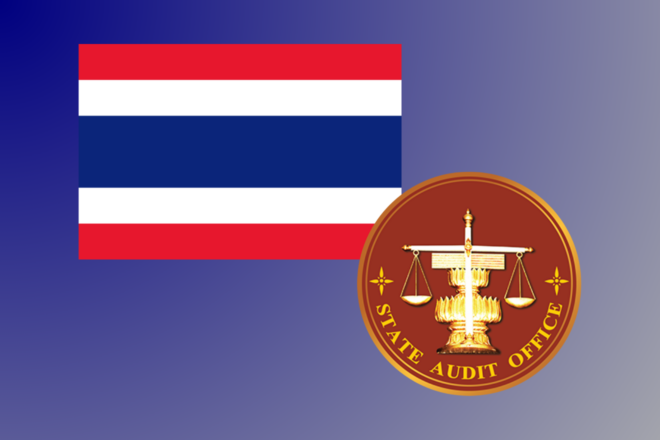Duties and Powers of the State Audit Commission of Thailand to Order an Administrative Penalty

By: Professor Dr. Orapin Phonsuwan Sabyeroop
The concept of this article, “Duties and Powers of the State Audit Commission of Thailand to Order an Administrative Penalty” was inspired by reflections upon a similar French model. Professor Dr. Orapin Phonsuwan Sabyeroop wrote an article titled “Control of Budget Enforcement and Fiscal Administration by Judicial Bodies in the French Public Finance System” after completing her Ph.D. at the University of Paris II. Thailand adopted this concept, but adjusted it to fit the country’s context at the time. Due to the inability to establish a court quickly and timely, Thailand initially adopted the model of a board, or the Board of Audit, to enforce these principles before developing a court system similar to France’s in the future.
The concept of fiscal and financial discipline first appeared in the Constitution of the Kingdom of Thailand in 1997, which outlined the essence of the constitutional law concerning the audit of state finances, including the powers and duties of the Board of Audit and the Committee on Budgetary and Fiscal Discipline. This specifically involved setting criteria and methods for considering budgetary and fiscal discipline, determining administrative fines, and adjudicating disciplinary and budgetary and fiscal offenses as the supreme body.
The Organic Act on State Audit, B.E. 2542 (1999), was enacted, establishing the Board of Audit as the supervisory body and the highest decision-making body on budgetary and fiscal disciplinary offenses. The Committee on Budgetary and Fiscal Discipline was responsible for gathering and preliminarily considering matters before submitting them to the Board of Audit for disciplinary action. According to the regulations of the Board of Audit on budgetary and fiscal discipline in 2001, the penalties for those found guilty of budgetary and fiscal disciplinary offenses were set at four levels as follows:
- First-tier penalty: A fine not exceeding one month’s salary.
- Second-tier penalty: A fine equivalent to a salary from two to four months.
- Third-tier penalty: A fine equivalent to a salary from five to eight months.
- Fourth-tier penalty: A fine equivalent to a salary from nine to twelve months.
These penalties are designed to be commensurate with the nature of each offense, with the maximum penalty being a fine equivalent to no more than twelve months’ salary.
Following the promulgation of the Constitution of the Kingdom of Thailand in 2007, the term “budgetary and fiscal discipline” was changed to “financial, fiscal, and budgetary discipline.” This amendment mandated the enactment of state financial and fiscal laws to establish a framework for fiscal and financial discipline. However, until the last day this constitution was in effect, the parliament had not enacted any state financial and fiscal law.
During this period, the definition of financial and fiscal discipline was expanded to include “principles related to medium-term financial planning, revenue management, guidelines for preparing the state’s expenditure budget, financial and asset management, accounting, public funds, debt incurrence or operations binding the state’s assets or financial obligations, criteria for setting aside emergency or necessary reserves, and other related activities. These were to serve as a framework for revenue management and expenditure control based on principles of stability, sustainable economic development, and social equity,” aiming to broaden the authority of the Committee on Financial and Fiscal Discipline in adjudicating state officials’ financial actions.
The Constitution of the Kingdom of Thailand of 2017 stipulates that the state must strictly maintain financial and fiscal discipline to ensure the stability and sustainability of the state’s fiscal and financial position according to the law on state fiscal and financial discipline. This led to the enactment of the State Fiscal and Financial Discipline Act of 2018, which covers the framework for fiscal and budgetary operations of the state, fiscal discipline regarding income and expenditure (both budgetary and extra-budgetary funds), state asset management and treasury, and public debt management. This act serves as a principle for maintaining the state’s financial and fiscal stability and minimizing the risk of expenditures that do not yield sustainable benefits or create excessive debt for the country. Additionally, the act specifies that in cases of financial and fiscal disciplinary offenses by the state as defined therein, administrative sanctions shall be imposed in accordance with the constitutional law on state audit, which is the State Audit Act of 2018. This act abolished the Committee on Budgetary and Fiscal Discipline but retained the power of the Board of Audit to impose administrative sanctions, with the Auditor General proposing administrative sanctions, which include:
- Disciplinary punishment,
- Public reprimand, and
- Administrative fines.
In the process of considering administrative sanctions, the State Audit Commission takes into account the severity of the behavior constituting the offense and the damage resulting from such actions. The administrative fine imposed cannot exceed twelve months of the salary of the person being sanctioned. Appeals against these decisions can be made to the Supreme Administrative Court within ninety days from the date of receiving the order.
The process for considering administrative sanctions allows for the parties involved to argue, object, and present their evidence, adhering to the principles of appeal and annulment of the judgment. The State Audit Commission has established criteria and methods for considering state fiscal and financial disciplinary offenses according to the State Audit Commission’s regulations on the adjudication of state financial and fiscal disciplinary offenses 2019, in line with the right to a fair trial. This includes ensuring the proceedings are conducted within a reasonable period, publicly communicated, quality-controlled, and impartially judged.
Furthermore, the State Audit of Thailand guarantees the independence of its officials (according to the principle of Independence of the SAI’s members), ensures freedom of access to information, and prevents double jeopardy (according to the principle of non-accumulation of sanctions). The Organic Act on State Audit of 2018 also stipulates those proceedings for state financial and fiscal disciplinary offenses are suspended if the accused dies or if the proceedings related to the state’s financial and fiscal disciplinary offenses are not completed within five years from the date the offense was committed, adhering to the principle of a reasonable period.
All these processes for considering state financial and fiscal disciplinary offenses are underpinned by legal provisions, following the principle of the legal basis of the responsibility regime. The Board of Audit does not exercise any power beyond what is legislated.
These practices demonstrate Thailand’s compliance with the principles of INTOSAI P-50, with some aspects clearly reflected in the laws related to state auditing, while others are embodied in general laws that are also applied. It is hoped that these principles will mark a significant step in controlling and auditing state financial and fiscal discipline, evolving from an independent organization towards a more judicial-like entity in the future.
About the author
Professor Dr. Orapin Phonsuwan Sabyeroop is currently serving as the State Audit Commissioner of Thailand.With a comprehensive academic background that includes a Bachelor of Laws, a Master of Laws, a specialized Master’s in Fiscal and Tax Law, an Advanced Certificate in Fiscal Law, and a Doctorate in Law, her expertise is grounded in extensive research and scholarship. She has significantly contributed to legal education and research as a Law Professor and the Head of the Public Law Department at Thammasat University, mentoring a new generation of scholars in the intricacies of fiscal law and policy.





